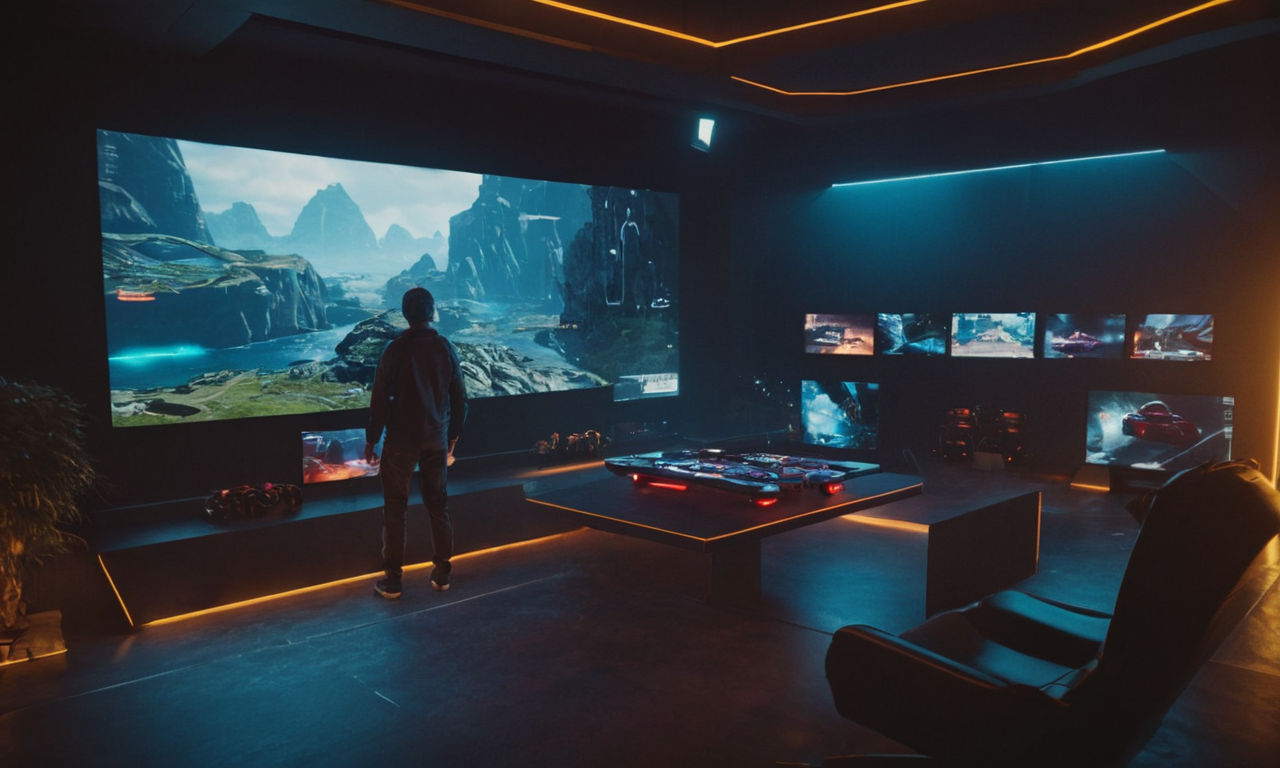Introduction
The gaming industry in 2023 is encountering a myriad of challenges that are reshaping the landscape for both players and developers. From technical obstacles to cultural transformations, understanding the complexities of these issues is crucial for navigating the evolving realm of gaming.
Technical Hurdles in Gaming
Rising System Requirements and Hardware Costs
In 2023, one of the primary challenges in the gaming world right now revolves around escalating system requirements and hardware costs. As game developers strive to deliver immersive experiences with cutting-edge graphics and sophisticated gameplay mechanics, the demand for more powerful hardware is on the rise. This poses a barrier for many players who may find it financially challenging to keep up with the latest equipment upgrades to enjoy new titles fully.
Compatibility Issues with New Technologies
Moreover, the integration of new technologies such as ray tracing, real-time lighting, and AI-driven features introduces compatibility hurdles for both gamers and developers. Ensuring seamless functionality across a diverse range of devices and configurations is a persistent challenge that impacts the gaming experience and development process.
Impact of VR and AR on Gaming Experiences
Virtual Reality (VR) and Augmented Reality (AR) are rapidly shaping the future of gaming, offering innovative ways to engage players in immersive environments. However, implementing these technologies comes with its own set of challenges, from designing games that optimize VR/AR capabilities to addressing concerns about motion sickness and accessibility for all players.
Cultural Shifts and Gamer Expectations
Changing Demands of Modern Gamers
The evolving preferences and expectations of modern gamers present significant challenges for game developers. With a diverse player base spanning different generations, genres, and platforms, catering to the varied tastes and interests of audiences becomes increasingly complex. Adaptability and a deep understanding of player demographics are critical for creating games that resonate in this dynamic landscape.
Inclusivity and Diversity in Game Content
In 2023, the gaming industry is witnessing a significant push towards inclusivity and diversity in game content. Players are demanding representation, cultural authenticity, and meaningful storytelling that reflect the rich tapestry of global communities. Game developers are challenged to address these expectations by creating inclusive characters, narratives, and gameplay experiences that resonate with a diverse player base.

Influence of Social Media on Gaming Communities
Social media platforms have become integral to the gaming ecosystem, influencing player behaviors, trends, and community interactions. The power of social influencers, live streaming, and user-generated content has transformed how games are discovered, shared, and experienced. Navigating the impact of social media on gaming communities, from building brand loyalty to managing online toxicity, requires a nuanced understanding of digital engagement strategies.
By delving into these challenges, the gaming industry can adapt, innovate, and foster a thriving environment that caters to the evolving needs and expectations of players worldwide.
Game Development Obstacles
The gaming industry is currently navigating a landscape rife with challenges and hurdles that impact game development. From technical constraints to market demands, developers encounter a plethora of obstacles that shape the gaming experience for players worldwide.
Constraints of Time and Resources
Developing a successful game requires a significant investment of time and resources. Meeting deadlines while maintaining high-quality standards often proves to be a delicate balancing act. Tight schedules can lead to rushed development cycles, resulting in subpar games that fail to meet player expectations. Moreover, limited resources can hinder the implementation of innovative ideas, stifling creativity in game design.
Balancing Innovation with Market Demands
In an industry driven by innovation and creativity, developers face the challenge of striking a balance between pushing boundaries with new ideas and meeting the expectations of the market. While players crave fresh and original content, developers must also consider the commercial viability of their projects. Striving for innovation without neglecting market trends is essential to creating games that resonate with audiences.
Monetization Challenges and Microtransactions
Monetization has become a significant concern in the gaming industry, with developers exploring various models to generate revenue. The rising prevalence of microtransactions and loot boxes has sparked debates on ethical game monetization practices. Balancing the need for profitability with player satisfaction has become a delicate tightrope walk for developers, as excessive monetization strategies can alienate players and tarnish a game's reputation.
Regulatory Landscapes and Legal Issues
In addition to development challenges, the gaming industry faces a complex web of regulatory and legal issues that impact game content, distribution, and privacy. Navigating these legal landscapes is crucial for developers to ensure compliance and avoid potential pitfalls.
Government Regulations on Gaming Content

Government bodies worldwide are increasingly scrutinizing gaming content, leading to regulations aimed at protecting vulnerable audiences, particularly minors. Content restrictions, age ratings, and censorship laws vary across regions, posing challenges for developers seeking to create globally appealing games while adhering to diverse regulatory frameworks.
Loot Box Controversies and Gambling Laws
The controversy surrounding loot boxes and their potential links to gambling has drawn regulatory attention to the gaming industry. Some jurisdictions have started equating loot box mechanics with gambling, prompting legal measures to prevent potential harm to players, especially younger audiences. Developers must navigate these legal uncertainties to ensure compliance and ethical game design practices.
Impact of Data Privacy Regulations on Game Development
Data privacy regulations, such as the General Data Protection Regulation (GDPR), have significant implications for game developers handling user data. Compliance with strict privacy laws necessitates robust data protection measures and transparency in data collection practices. Integrating stringent privacy protocols into game development processes is essential to safeguarding user information and maintaining trust among players.
Market Dynamics in the Gaming Industry
The gaming market is dynamic and ever-evolving, shaped by competition, technological advancements, and changing consumer preferences. Understanding these market dynamics is crucial for industry stakeholders to anticipate trends and stay competitive in a rapidly shifting landscape.
Growing Competition Among Gaming Companies
The gaming industry is witnessing unprecedented competition, with a surge in new entrants and established companies vying for market share. Developing standout games that captivate audiences amidst fierce competition is a daunting task for developers. Differentiation through unique gameplay mechanics, compelling narratives, and engaging multiplayer experiences has become essential to stand out in a crowded market.
Trends in Mobile Gaming and Cloud Gaming
Mobile gaming continues to dominate the gaming landscape, offering accessibility and convenience to a broad audience of players. The proliferation of smartphones and tablets has transformed the way games are consumed, with developers increasingly focusing on creating mobile-friendly experiences. Moreover, the rise of cloud gaming services has opened new possibilities for streaming high-quality games across devices, challenging traditional distribution models and hardware limitations.
Influence of Streaming Platforms on Game Distribution
Streaming platforms, such as Twitch and YouTube Gaming, have revolutionized the way games are consumed and shared with audiences. Influencers and content creators play a significant role in driving player engagement and shaping game trends. Developers must adapt their marketing strategies to leverage the reach of streaming platforms, collaborating with influencers to promote their games and reach a wider audience.
In conclusion, the gaming industry in 2023 is navigating a complex landscape fraught with challenges, from game development constraints to regulatory uncertainties and evolving market dynamics. Overcoming these obstacles requires strategic planning, creative solutions, and adaptability to cater to the changing needs and expectations of players in a rapidly evolving digital ecosystem.

Impact of COVID-19 on Gaming Trends
The COVID-19 pandemic significantly impacted the gaming industry in 2023, leading to various shifts and challenges that both players and developers have had to navigate.
Shift to Remote Work in Game Development
The pandemic forced many game development studios to transition to remote work environments.
Developers had to adapt to collaborating virtually, which posed challenges in communication, coordination, and maintaining productivity.
Remote work also affected the efficiency of game testing and debugging processes, potentially leading to longer development timelines.
Surge in Online Gaming Communities
With social distancing measures in place, there was a notable surge in online gaming communities.
Online multiplayer games witnessed a spike in player engagement as individuals sought virtual connections and entertainment.
The increase in online gaming communities also presented challenges in ensuring fair play, tackling toxicity, and maintaining a positive gaming environment.
Challenges in Maintaining Player Engagement
As more players turned to gaming for social interactions and entertainment during lockdowns, there was a growing demand for engaging and immersive gameplay experiences.
Game developers faced the challenge of keeping players interested and invested in their games amidst a competitive market.
Maintaining player engagement required innovations in gameplay mechanics, storytelling, and community-building features.
Conclusion
In conclusion, the gaming industry in 2023 continues to face an array of challenges influenced by the unprecedented events of the COVID-19 pandemic.
Recap of the Key Challenges Faced in the Gaming Industry
Remote work in game development resulted in communication and productivity challenges.
The surge in online gaming communities posed issues related to fair play and toxicity.
Maintaining player engagement proved to be a critical concern for developers in a competitive market.
Potential Strategies to Overcome Obstacles and Innovate
Embracing agile development methodologies to adapt to remote work challenges and optimize collaboration.
Implementing robust community moderation tools to foster a healthy gaming environment in online communities.
Constantly innovating gameplay mechanics and content to sustain player engagement and differentiate offerings in the market.



